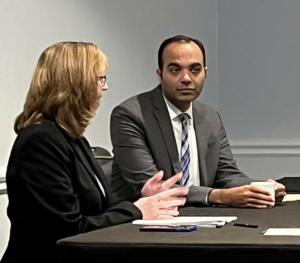The May 2023 WBA Compliance Journal is now available. In this edition, readers will find an article covering recently issued guidance by FDIC, CFPB, and OCC, each of which identify activities expected to be a focus of upcoming compliance examinations. Readers will also find an article highlighting an interagency statement and an interim final rule regarding the transition from US LIBOR. The publication also includes a summary of recently published agency rules and notices, other important compliance-related updates, and a WBA Education Calendar which lists upcoming training events.
Posts
 By Rose Oswald Poels
By Rose Oswald Poels
Last Thursday, the Bureau of Consumer Financial Protection (CFPB) issued its long-awaited final Section 1071 business data collection rule. The Wisconsin Bankers Association (WBA) has been engaged in the rulemaking process since the proposal’s inception. While I know the general requirements for this rule came directly from the Dodd-Frank Act, CFPB chose to add in many more data points than what the law required which have made this rule very burdensome for the banking industry and intrusive for banks’ small business customers.

Just this past fall, I, along with several Wisconsin bankers, shared specific concerns of the proposal directly with CFPB Director Rohit Chopra. I am disappointed our concerns were largely disregarded given the requirements within the final rule. Our concerns of data privacy for small business customers remain.
Given the low threshold for rule applicability, the amount of data to be collected and reported, and the changes in process that will need be implemented, the rule will be burdensome to implement. While I and the WBA Legal team are currently working through the final rule and accompanying resources, below are highlights of the final Section 1071 rule. WBA will certainly be hosting educational events and will be creating resources around the final rule in the forthcoming months.
Highlights
- The final rule applies to banks that originated at least 100 covered originations in both of the two previous years.
- “Small business” means one with gross revenue of $5 million or less in the preceding fiscal year.
- Small businesses will be able to self-identify as women-, minority-, or LGBTQI+ owned.
- Lenders will be able to rely on financial and other information provided by the small business applicant.
- Mandatory compliance dates are staggered based upon the number of covered originations made by each bank, in particular:
- A bank must begin collecting data and otherwise complying with the final rule on October 1, 2024, if it originated at least 2,500 covered originations in both 2022 and 2023.
- A bank must begin collecting data and otherwise complying with the final rule on April 1, 2025, if it:
- Originated at least 500 covered originations in both 2022 and 2023;
- Did not originate 2,500 or more covered originations in both 2022 and 2023; and
- Originated at least 100 covered originations in 2024.
- A bank must begin collecting data and otherwise complying with the final rule on January 1, 2026, if it originated at least 100 covered originations in both 2024 and 2025.
As mentioned above, the CFPB has created resources which accompany the final rule. The resources include an executive summary, quick reference guides, and a data point chart.
By Hannah Flanders
Throughout the United States, millions of Americans are left out of mainstream financial services due to their credit score, or lack thereof. As financial inclusion — with particular emphasis on providing the underbanked access, expanding opportunities for all, and eliminating barriers — becomes increasingly critical in ensuring every consumer has the possibility to gain wealth, it is equally as important that banks understand the unique challenges these individuals face and how they can best be served.
What Does it Mean to be Credit Invisible?
According to information compiled by Oliver Wyman based on data by Experian and previous Consumer Financial Protection Bureau (CFPB) research, around 28 million American adults are credit invisible. Additionally, 21 million adults in the U.S. are considered unscorable. Defined as one’s lack of credit history and score, credit invisibility often results in difficulty accessing credit products. Unscorability, on the other hand, defines the limited information one has in their mainstream credit file and therefore their lack of ability to generate a conventional credit score.
The CFPB highlights that not only are a disproportional number of credit invisible customers located in low-income neighborhoods, but that around 15% of Black and Hispanic consumers are credit invisible in comparison to only around 9% of white customers.
However, as 90% of the top lenders throughout the U.S. require at least six months of recorded credit activity, according to the credit bureau Experian, credit invisible consumers often do not have access to reliable means to establish and expand their credit.
With minimum balance requirements and fees being cited within the top five reasons as to why 4.5% of households in the U.S. remain unbanked, according to the Federal Deposit Insurance Corporation’s (FDIC) 2021 FDIC National Survey of Unbanked and Under-banked Households report, it is critical that bankers find alternative solutions for those looking to expand their opportunities, meet their financial goals, own a home, or simply begin their financial journey.
Providing Accessible Credit
Lack of access to mainstream financial services or other low-cost credit products often does not stop individuals from borrowing or seeking certain forms of financial assistance. In fact, this may inadvertently cause one to engage in high-cost, potentially predatory lending cycles.
“Banks throughout America play an important role in not only providing opportunities for consumers to access traditional credit services, but also in assisting individuals to establish and maintain their credit,” says Jeff Langkamp, vice president — chief compliance officer at Bank Five Nine in Oconomowoc. “Having no credit score most likely means that individuals will have to pay a higher interest rate or use payday lenders who charge outrageously high interest rates. Additionally, establishing a credit score to purchase a house or car allows families to build generational wealth.”
To bankers, providing access to credit may mean offering secured credit cards or developing a credit invisible loan program, which involves making smaller loans to invisibles to gradually build their scores or looking beyond the standard evaluation producers to aspects such as their residency and employment stability.
At Bank Five Nine, customers have access to the Achieve Credit Builder™ program, an account certified as meeting the Bank On National Account Standards. The product, according to Langkamp, helps individuals establish or repair their credit at little to no cost.
“The average age of our customers that are taking part in the credit builder program is 26, so the product is helping younger individuals as they begin their credit journey,” highlights Langkamp.
Positioning Consumers for Success
In December 2022, Fannie Mae announced that it would be strengthening its underwriting program Desktop Underwriter® to responsibly expand eligibility and further simplify the borrowing process for individuals without credit scores.
“Traditional lending practices make it hard for borrowers with no credit score to access credit,” said Malloy Evans, executive vice president and head of single-family business, in the press release published on December 6.“[As a result,] Fannie Mae has taken steps that may help them responsibly qualify for a home loan using data that provides a more holistic view of how they manage their money.”
The enhancements released by Fannie Mae update existing eligibility criteria to permit standard loan-to-value (LTV), combined loan-to-value (CLTV), and high credit loan-to-value (HCLTV) ratios on certain properties and expand the standard maximum allowable debt-to-income ratio to 50%. Additionally, the organization has created an automated option for documenting nontraditional credit sources to simplify the process for both the lender and the borrower.
A significant component of this update also includes allowing borrower-permissioned data that consider a borrower’s transaction patterns and balance trends.
Embracing Alternative Credit Data
As many banks and businesses across the U.S. look to alternative ways to promote financial capability among all consumers, many are looking to consumer-permissioned data. Experian defines alternative credit as expanded Fair Credit Reporting Act (FCRA)-regulated data. This data often includes rental payments, small-dollar loans, and other consumer-permissioned data.
“Each individual situation is different; the most important thing is finding a plan that fits the needs and financial goals of the individual,” emphasizes Langkamp. “In addition to resources like Achieve Credit Builder™, our bank encourages our customers to take advantage of self-reporting opportunities like rental housing, and other payments that may not be reflected on a credit report.”
As establishing good credit remains a critical component of one’s ability to acquire wealth, self-reporting has quickly become an integral aspect in assisting individuals to easily establish a credit score.
In an effort to make credit accessible to all communities, Experian has developed free resources for consumers to utilize as they develop their credit score. Experian Go™ provides individuals with education and insights unique to their credit journey. Experian Boost™ allows consumers to connect their bank account or credit card to their Experian credit file. By making on-time payments, individuals can highlight their good spending habits and raise their credit score.
“By using expanded data sources and better analytics in credit decisions, banks can help more consumers gain access to credit while making more informed decisions,” says Greg Wright, executive vice president and chief product officer for Experian Consumer Information Services. “This is a win for both lenders and consumers — and it’s just the right thing to do.”
Wright adds that score models used today have historically left nearly 50 million Americans living with a limited credit history locked out of the credit ecosystem. “Leveraging expanded data sources and advanced analytics can help change this narrative,” he emphasizes.
While credit invisible and unscorable individuals remain a significant portion of our communities, there are many opportunities for banks to assist. Whether it be offering low-cost products and secured credit cards or encouraging consumers to utilize resources that educate them on their individual credit journey, bankers play a major role in promoting financial security for generations to come.
“This is an exciting time for the banking and financial services industry,” concludes Wright. “By leveraging the right tools, we are nearing a point where we can say — no matter who you are, where you live, or what part of your financial journey you’re on — that we can score you and help you access the financial services you need.”
 By Rose Oswald Poels
By Rose Oswald Poels
Every fall, I travel to Washington D.C. with a small group of bankers to visit regulators. During this trip, we nearly always meet with staff from Consumer Financial Protection Bureau (CFPB).
Since CFPB’s inception, we inevitably encourage the CFPB staff during each of these annual visits to focus more on the non-bank financial organizations that operate in the traditional “banking” space. Nearly every time we have this conversation, they nod and share that they provide this type of supervision typically through a complaint-based system. This means that if enough consumers complain about a particular financial organization (not a regulated bank), they will investigate and take whatever action they deem appropriate. Certainly, this has been incredibly frustrating for bankers to hear over the years given that many non-bank actors contributed to the causes of the Great Recession back in 2008 and 2009 and CFPB’s mission is that of protecting consumers. It has been too easy for CFPB to focus on the banking industry through their rulemaking and enforcement authorities since banks are easier to find with traditional brick-and-mortar offices.
I was pleasantly surprised to learn recently, however, that the CFPB has focused some of its attention on the non-bank financial industry by assessing fines to fintech companies for actions that have ultimately harmed consumers. Specifically, CFPB recently levied a $2.7 million fine against lender Hello Digit for a range of issues including misleading marketing claims such as “no overdraft fees.” This claim of no overdraft fees was one of several promises made to consumers by Hello Digit that were, in fact, not always true. Other fintechs have made similar claims regarding no overdraft fees as well, including digital lender Chime, that have turned out to be misleading or only true in a limited set of circumstances.
At the same time, the FDIC recently issued cease and desist orders against five crypto firms for making false or misleading statements suggesting that their digital assets were FDIC-insured. According to the FDIC, each of these companies made false representations on their website and social media accounts stating or suggesting that certain crypto-related products are FDIC-insured or that stocks held in brokerage accounts are FDIC-insured. As we all know, these representations are false and misleading.
There are many fintechs that are working to do the right thing and help improve the financial industry through technological efficiencies, but some reasonable level of regulation and oversight is important for these institutions just like banks. These recent regulatory actions against non-bank financial organizations are good reminders that it is important to continue sharing our concerns with regulatory agencies related to non-bank actors and to continue to stress to our clients and the public how trustworthy banks are.
If you are interested in accompanying me on a future fall regulatory agency trip to D.C., please let me know and I will add you to the list. I try to keep the group small, limited to 12 bankers, to ensure meaningful dialogue with the regulatory agencies. Bankers who have joined me in the past have found this trip to be worthwhile given much of our frustration and burden comes from regulation. In the meantime, WBA will continue to advocate for the members on these and other issues affecting the industry.
 By Rose Oswald Poels
By Rose Oswald Poels
Since the enactment of the Dodd-Frank Act in 2010, WBA has assisted members in understanding and implementing countless layers of new federal regulations — some as straight forward as creating and delivering a new one-page notice, others much more complex, including TRID, mortgage servicing rules, and QM/ATR underwriting standards (and those are only the most recent of new laws).
An area of the Dodd-Frank Act that much of the industry has been anxiously awaiting is that of Section 1071. As a reminder, Section 1071 of the Dodd Frank Act amended the Equal Credit Opportunity Act (ECOA) to require that financial institutions collect and report to the Consumer Financial Protection Bureau (CFPB) certain data regarding applications for credit for women-owned businesses, minority-owned businesses, and small businesses.
Having been in this industry for over thirty years, I will say that the forthcoming business data collection and reporting regulation is of the magnitude — both in cost and in operational impact — of what bankers experienced with the implementation of other industry-changing regulations such as the Bank Secrecy Act, Reg CC, or the SAFE Act. I can recall pre-BSA procedures, and now we operate in an implemented BSA world; a time of in-branch check encoding and processing to today’s electronic presentment, centralized clearing, and near live-time processing; and of course, a time when TILA and RESPA were separate disclosures versus today’s mortgage loan application and closing procedures due to TRID rules.
The same will be true after full implementation of a final Section 1071 rule. This law, once finalized, will change how business credit applications are processed. Data will need to be collected and reported as never before. Some members experience similar types of data collection and reporting under the Home Mortgage Disclosure Act (HMDA), but even non-HMDA reporting banks may be required to comply with Section 1071 data collection and reporting.
Based upon recent agency regulatory agenda filings and court filings earlier this month, it is expected that CFPB will finalize its Section 1071 Small Business Lending Data Collection and Reporting Rule by March 2023. Rest assured, I understand the impact this rule will have on the membership. In my comment letter to CFPB regarding its Section 1071 proposal, I advocated for the collection of only those data points required under the Dodd-Frank Act, a higher exemption threshold, and for a longer implementation period to help lessen the impact of the new regulation.
Late last year, WBA prepared a toolkit to help senior management, commercial lenders, loan processors, compliance officers, and others involved with small business lending to better understand the impact of CFPB’s proposal on the bank. Those resources are still available, and I would recommend those in the areas mentioned become familiar with the general concepts of the proposal, understand what could become law, and begin considering the impact on the bank. Planning will be crucial with a regulation as impactful as what Section 1071 will be.
In addition to being vocal during the regulatory process on Section 1071, WBA has advocated for repeal of Section 1071 with our congressional delegation for the last 10 years. Although it is late in the session, I am pleased to share that Rep. Scott Fitzgerald (WI-05) introduced on July 20 the Making the CFPB Accountable to Small Business Act which would repeal Section 1071 of the Dodd-Frank Act. Rest assured, WBA will continue its strong advocacy at all levels to try and reduce this regulatory burden. In the meantime, WBA plans to create further resources once the final rule is released and will help answer questions related to the new regulation.
Current WBA Section 1071 resources may be found on the WBA Compliance Resources webpage.
 By Rose Oswald Poels
By Rose Oswald Poels
As many would know, I started my career at WBA answering compliance questions for members through WBA’s Legal Call Program and a frequently asked question has long been, “May a bank pull a credit report on a non-applicant spouse when a married Wisconsin resident applies for credit individually?” WBA’s longstanding answer has been yes. Banks have a permissible purpose under the Fair Credit Reporting Act (FCRA) to pull credit on the non-applicant spouse when an applicant is a married Wisconsin resident. Under Wisconsin’s Marital Property Act (MPA), the creditor should consider the couple a unit, taking into consideration all income and all debt of both spouses.
The Bureau of Consumer Financial Protection (CFPB) recently issued an advisory opinion regarding permissible uses of credit reports. The opinion appears to be primarily directed at consumer reporting agencies who furnish credit reports. However, given statements within the opinion regarding use of credit reports, I believe it worth a reminder about how the MPA plays a role in there being a legitimate business need for a bank to pull a credit report on a non-applicant spouse when a married Wisconsin resident applies for credit individually, as CFPB failed to take into considerations a state’s property laws when it analyzed permissible purposes under FCRA Section 604.
Under the MPA, when credit will result in an obligation that is “in the interest of marriage or the family” pursuant to sec. 766.56(1), Stats., creditors need to consider both the assets and liabilities of each spouse when evaluating an applicant spouse’s creditworthiness. By reviewing both the assets and liabilities of each spouse, the creditor can meet its obligations under s. 766.56(1) to consider “all marital property available to satisfy the obligation in the same manner that the creditor, in evaluating the creditworthiness of an unmarried credit applicant, considers the property of an unmarried credit applicant…” Credit reports are the tools most often used to determine liabilities of both spouses.
The Federal Trade Commission (FTC), the agency with authority for banks regarding FCRA prior to the Dodd-Frank Act, recognized states’ property laws under its interpretation of FCRA permissible purposes. To use a credit report, the FCRA provides that one must have a permissible purpose for the report. FCRA Section 604 sets forth the permissible purposes of credit reports. Section 604(a)(3)(A) allows a consumer reporting agency to furnish consumer reports to a person which it has a reason to believe “intends to use the information in connection with a credit transaction involving the consumer on whom the information is to be furnished and involving the extension of credit to, or review or collection of an account of, the consumer.” Past FTC interpretation of this section has confirmed that creditors may pull a credit report on a non-applicant spouse.
In particular, FTC interpretation of FCRA Section 604(a)(3)(A) has been,
“A creditor has a permissible purpose to obtain a consumer report on an applicant’s spouse if that spouse will be permitted to use the account or will be contractually liable upon the account, or if the applicant is relying on the spouse’s income as a basis for repayment of the credit requested. In addition, a creditor may obtain a consumer report on an applicant’s spouse if (i) the state law doctrine of necessaires (which may make a consumer liable for certain debts of a spouse) applies to the transaction, (ii) the applicant resides in a community property state, (iii) the property upon which the applicant is relying as a basis for repayment of the credit requested is located in such a state, or (iv) the applicant is acting as the agent of the nonapplicant spouse.”
The requirements under the MPA and FTC’s interpretation of a permissible purpose under the FCRA were the areas of law WBA has cited as rationale why banks may use the consumer reports of both the married Wisconsin resident applicant and his/her non-applicant spouse when determined debt in connection with new credit or review of an account.
However, with CFPB having issued an advisory opinion regarding the furnishing and use of credit reports under the FCRA, members need be aware of the opinion.
In its opinion, CFPB stated that the permissible purposes listed in FCRA section 604(a)(3) are consumer specific and that a consumer reporting agency may not provide a consumer report to a user under FCRA section 604(a)(3) unless it has reason to believe that all of the consumer report information included pertains to the consumer who is the subject of the user’s request. CFPB believes section 604 analysis need be on a consumer-by-consumer basis, intending the use of information in connection with a credit transaction to be one involving the consumer on whom the information is to be furnished and involving the extension of credit to, or review or collection of an account of, the consumer.
CFPB’s new advisory opinion could be read to not allow a credit report to be pulled on a non-applicant spouse as the non-applicant spouse is not party to the application. In writing this opinion, CFPB has failed to consider a state’s property law — such as the Wisconsin MPA — and of the legitimate business need for debt information. Separately, a creditor cannot require spouses to apply together to then obtain a credit report on both spouse as that would be a violation of Regulation B. CFPB’s focus only on federal law when writing this advisory opinion without considering state marital property laws raises a question for banks in marital/community property states, including Wisconsin banks when trying to comply with s. 766.56(1) Stats.
WBA believes banks do have a permissible purpose under state law, and therefore under FCRA section 604, to obtain a credit report of a non-applicant spouse in connection with an application involving a married Wisconsin resident, since CFPB’s advisory opinion focuses solely on the fact that FCRA permissible purposes are consumer-specific and is silent on any relevant state law.
It is clear under s. 766.56(1), Stats. that when credit will result in an obligation, that is “in the interest of marriage or the family,” creditors need to consider both the assets and liabilities of each spouse when evaluating an applicant spouse’s creditworthiness. This requirement results in a legitimate business need to identify debts of both the applicant spouse and non-applicant spouse. Furthermore, pursuant to s. 766.55(1), Stats., an obligation incurred while married is presumed to be incurred in the interest of the marriage or family, and under para. (2) the obligation is to be satisfied from all marital property and all other property of the married Wisconsin resident applicant. These MPA provisions make the non-applicant spouse part of the credit transaction and resulting obligation for which a credit report is being used thereby meeting the conditions under CFPB’s advisory opinion despite CFPB not specifically addressing marital property interests.
Due to the requirements of ss. 766.55 and 766.56, Stats., banks have a permissible purpose under FCRA section 604(a)(3) to use a consumer report of a non-applicant spouse when an applicant is a married Wisconsin resident. A bank’s current practice to pull a credit report on both spouses need not change as a result of CFPB’s advisory opinion.
While CFPB’s release is only that of an advisory opinion, and is not regulation, I want to make sure that members are aware of the opinion and its narrowness, along with WBA’s thoughts on it.
June 1, 2021–May 31, 2022
This year, attorneys Heather MacKinnon, Scott Birrenkott, and President/CEO Rose Oswald Poels submitted 16 comment letters in response to requests for comment on rulemaking affecting the banking industry.
Through this process, the WBA Legal Team was able to advocate on behalf of all WBA members for the betterment of the banking industry. From digital assets to examinations and fees, comment letters are a great opportunity for members of the banking industry to inform agencies about the impact of rulemaking and provide examples.
As part of the rulemaking process within the Administrative Procedure Act (APA), all agencies are required to allow the public an opportunity to comment on proposed rules for a prescribed period (minimally 30 days). All WBA members are encouraged to share their comments with federal and state agencies as requested. Information regarding comment letters, or WBA-created letter templates — when available — are typically shared with the membership in the Wisconsin Banker Daily. Additional rulemaking developments at the federal level are compiled in the monthly WBA Compliance Journal.
Once the public has commented, each agency must determine how to proceed given the feedback received. This year, the WBA Legal Team addressed five federal agencies and further helped inform said agencies on the impact of their proposed rulemaking.
Six Comment Letters Filed with the FDIC
Over the past year, WBA filed six comment letters with Federal Deposit Insurance Corporation (FDIC). Two of WBA’s letters commented on FDIC’s actions regarding examinations. In the first, WBA commented on the FDIC’s proposed hybrid approach to bank examinations and in the second, WBA commented on the post-examination surveys related to FDIC Safety and Soundness and Consumer Compliance examinations. In each letter, WBA emphasized the importance of the FDIC establishing consistent coordination and communication with banks.
Three Comment Letters Filed with the CFPB
WBA wrote three letters this year to the Consumer Financial Protection Bureau (CFPB). Most recently, WBA responded to CFPB’s concerns regarding products which feature “junk fees,” assuring CFPB that the Wisconsin financial services marketplace is competitive, featuring a diverse range of high-quality, convenient, innovative, and competitively priced products and services. Additionally, WBA highlighted that, despite CFPB’s concerns, the market is highly regulated, and that further rulemaking is unnecessary as fees are already subject to disclosure requirements.
Four Comment Letters Filed with the FRB
This year, WBA also filed four comment letters with Board of Governors of the Federal Reserve System (FRB). In one of the letters, WBA addressed FRB’s request for comment regarding the evaluation of account and services requests. WBA acknowledged FRB’s attempt to create consistency, but ultimately expressed concern with allowing access to the payment system by entities with little or no regulatory oversight, lack of protection, and minimal capital and liquidity requirements, among others. WBA proposed that FRB establish standards or requirements for users, maintain ongoing review of those involved, as well as coordinate an FRB-led evaluation committee.
One Comment Letter Filed with the HUD
In late May, WBA expressed support of the Department of Housing and Urban Development’s (HUD) proposal to extend a term for loan modifications. The modification would allow mortgagees to modify Federal Housing Administration (FHA) insured mortgage loans by recasting the total unpaid amount due for a new term limit of 480 months — an increase from a term limit of 360 months; allow FHA-loan borrowers similar flexibility and benefits as is available for Fannie-/Freddie-loan borrowers; and creates yet another tool for Wisconsin’s financial institutions to use in their continued work to help find solutions for struggling borrowers to retain their homes.
One Comment Letter Filed with the OCC
In a letter filed with the Office of the Comptroller of the Currency (OCC), WBA was able to comment on a final rule to adopt a new Community Reinvestment Act (CRA) framework. This regulation facilitated the issuance of joint CRA to an interagency basis which would allow for greater coordination on all CRA ruling between the OCC, FRB, and FDIC for the benefit of banks serving low- and moderate-income communities.
One Interagency Comment Letter Filed
Some rulemakings are issued on an interagency basis. This year, WBA commented on the FRB, FDIC, and OCC’s proposed interagency guidance on third-party relationships related to risk management. In the letter, WBA commented that this effort would promote consistency in their guidance as well as clearly articulate risk-based principles. In addition, WBA identified several ways Wisconsin banks will be impacted by the new guidance during final implementation.
Conclusion
Industry comment is a critical aspect to the rulemaking process. It is an opportunity for the industry’s voice to be heard, and it is important that the agencies hear from banks about how rulemaking affects you. WBA welcomes feedback on comment letters because it is key that we, and the agencies, hear directly from members.
For more information on the rulemaking process, comments, and upcoming rules, contact the WBA Legal Department at wbalegal@wisbank.com. For a full list of the comment letters filed during the 2021–22 fiscal year, visit www.wisbank.com/advocacy/comment-letter-library.
*This article has been updated from previous published editions
With the mandatory compliance date for the new, revised General QM loan definition just on the horizon, banks should ensure their implementation plans are in place. In terms of a quick-look at dates, CFPB issued a final rule on December 29, 2020 (Final Rule) which amends the General QM loan definition in Regulation Z. The Final Rule included a mandatory compliance date of July 1, 2021. However, on April 27, 2021, CFPB extended that mandatory compliance date to October 1, 2022. The General QM Final Rule was effective on March 1, 2021 and, among other things, replaces the existing 43 percent debt-to-income ratio limit with price-based thresholds. As such, it presents the potential for significant changes to a bank’s mortgage lending operation.
To expand upon the new price-based thresholds with a general summary: a loan meets the revised General QM definition only if the annual percentage rate exceeds the average prime offer rate for a comparable transaction by less than the applicable threshold set forth in the Final Rule as of the date the interest rate is set. Additionally, the Final Rule removes Appendix Q as well as any requirements to use Appendix Q for General QM loans. Consequently, it amends the consider and verify requirements in Regulation Z and its associated commentary. First, it outlines the minimum considerations required by creditors, including, for example, the consumer’s current or reasonably expected income or assets. Second, it requires that creditors verify those considerations using reasonably reliable third-party records and reasonable methods and criteria.
Banks have likely already taken time to evaluate the categories of QMs they originate, and how the revised General QM definition may or may not affect its current loan policy and underwriting procedures. Even banks which originate Small Creditor QMs should still consider the extent to which they may or may not original General QMs. For example, does bank originate General QMs? Will it continue to do so, or will it exclusively utilize the Small Creditor QM exception, if applicable?
Given the mandatory compliance date of October 1, 2022 banks should confirm that their implementation steps are in place. Banks should prepare to fully transition current policies and procedures to conform with the new definition and consider what training might be necessary in advance of and after the transition.
As an additional resource, WBA has prepared an ATR/QM Toolkit to assist bankers.
Earlier this year the CFPB issued its long-awaited proposal for implementing Section 1071 of the Dodd-Frank Act, which requires collection of credit application data for small businesses, including women-owned and minority-owned small businesses. Comments on the proposal are due January 6, 2022. WBA will be creating a draft comment letter for use by members to reply to CFPB regarding concerns and impact of the proposal on banks. WBA encourages each bank to consider submitting its own letter reflecting bank-specific information. In preparation for these comments, WBA has prepared the following considerations regarding the rule.
What specific burdens will your institution face as a result the proposal? Some examples might include:
- Costs, technology, training, staffing, customer-facing educational information needs.
- Review of application process (based upon the rule’s definition of application).
- Is the proposed “firewall” process workable for the bank?
- What sort of implementation period will be necessary?
More specifically you might consider:
- Will bank need to hire new staff (compliance, processor, etc.)?
- Technology costs, such as a new platform, or 1071 data software.
- Costs associated with updating existing systems, testing, applications, training, development of new policies and procedures, legal consultation, review of implementation, etc.
- New annual costs related to collection such as customer service, data management, resolution of errors, exam prep, etc.
In preparation for filing comments, banks should plan to provide specific estimates where possible. For example, if bank predicts new software will be necessary to capture the data, be prepared to provide CFPB with a specific cost if possible.
As mentioned above, WBA will be creating a draft comment letter for use by members to reply to CFPB. The letter will be released shortly to allow banks time to personalize their letter with bank-specific information. For more information about CFPB’s Section 1071 proposal, please see the WBA Toolkit and PowerPoint materials.
WBA Legal has prepared a new toolkit to help senior management, commercial lenders, loan processors, compliance officers, and others involved with small business lending to better understand the impact of CFPB’s recently proposed small business rule on the bank. Once finalized, the requirement to collect and report certain data about small business credit applicants will have a dramatic impact on current application and processing operations and record retention.
A PowerPoint summarizing CFPB’s proposed rule has been created for use by staff who seek to present the main components of the proposal to lending and processing staff. The PowerPoint provides a background, proposed compliance dates, information regarding covered financial institutions, definition of small business, minority-owned and women-owned business, definition of covered application and covered credit transaction, what data must be collected, and reporting information.
In addition to the PowerPoint, the toolkit also includes a complete outline of the proposed rule, including the proposed commentary and several appendices. CFPB’s proposed rule summary and a data point chart are also included.
CFPB is accepting comments regarding its proposal. WBA hopes each bank will take into consideration the information provided in this toolkit, assess the proposal’s impact on the bank, and provide comment to CFPB regarding such impact.
WBA Legal will be creating a draft comment letter for use by members to reply to CFPB regarding concerns and impact of the proposal on banks. WBA encourages each bank to consider submitting its own letter reflecting bank-specific information.
Feel free to contact WBA Legal at wbalegal@wisbank.com regarding CFPB’s proposal.





